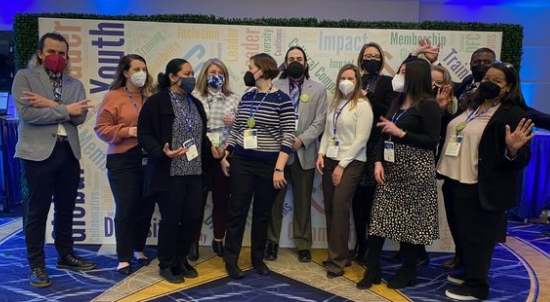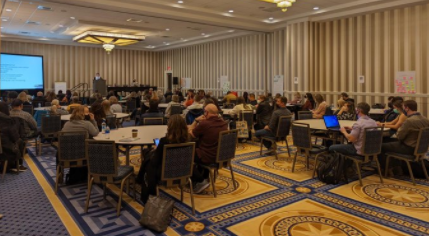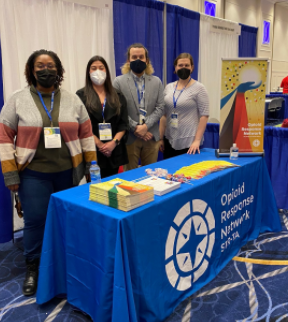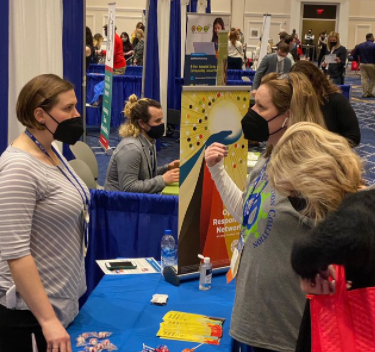Home > The PTTC at CADCA’s 2022 National Leadership Forum
 At the beginning of February, with anticipation and excitement, more than 2000 people prepared to safely gather in-person for CADCA’s 2022 Annual National Leadership Forum. CADCA 2020 was the last national conference the PTTC network attended; and it seemed appropriate this was our first national conference since the beginning of the COVID-19 pandemic.
At the beginning of February, with anticipation and excitement, more than 2000 people prepared to safely gather in-person for CADCA’s 2022 Annual National Leadership Forum. CADCA 2020 was the last national conference the PTTC network attended; and it seemed appropriate this was our first national conference since the beginning of the COVID-19 pandemic.
Prevention is better together. Undoubtedly, the last two years have tested our efforts as we’ve adapted to and relied on mostly virtual means to do our work. With this as a backdrop, participants eagerly gathered to safely connect in-person once again. There is so much value to being in the same physical space: the non-verbals, the unstructured in-between time to connect and network, the shared intellectual space, and the stumbling upon something once unknown. Our virtual spaces struggle to re-create these vital aspects of relationships, and we look forward to so much more ‘togetherness’ as it becomes safe to open up our world again.
The conference included spectacular content from across the world of prevention and beyond. Check out the highlight reel here. Or if you missed the event, you can register for the Forum-On-Demand and access 35 session recordings and more.
The New England PTTC provided two presentations during the week. The first presentation was a poster as a part of the Ideas Fair exhibit on the first night of the conference. Training and Technical Assistance Coordinator, Sarah Johnson and Director, Scott Gagnon presented a poster that showcased the New England PTTC’s graphic medicine toolkit for vaping prevention, called “In the Air”. This is a toolkit that utilizes a youth-driven graphic novel to drive facilitated discussions around vaping in schools and other youth-serving settings. Many preventionists from Region 1 and beyond stopped by to talk about this product, including some who have used the tool already and some who were new to the tool and to the PTTC Network. CADCA CEO General Barrye Price also stopped by to chat with Sarah and Scott to learn more about the product.
 On Thursday afternoon, New England PTTC Distance Learning Coordinator, Kristen Erickson and Scott Gagnon presented a workshop “Embracing Microlearning in Your Coalitions.” This workshop demonstrated how microlearning, which is a brief educational unit focused on a specific learning outcome, can be used by coalitions to promote prevention and contribute to workforce development. The presentation highlighted examples of microlearning from the New England PTTC, such as the Prevention Domain Video Project and Vaping and Cannabis Microlearning Toolkits, and provided tips and ideas for coalitions to develop their own microlearning tools.
On Thursday afternoon, New England PTTC Distance Learning Coordinator, Kristen Erickson and Scott Gagnon presented a workshop “Embracing Microlearning in Your Coalitions.” This workshop demonstrated how microlearning, which is a brief educational unit focused on a specific learning outcome, can be used by coalitions to promote prevention and contribute to workforce development. The presentation highlighted examples of microlearning from the New England PTTC, such as the Prevention Domain Video Project and Vaping and Cannabis Microlearning Toolkits, and provided tips and ideas for coalitions to develop their own microlearning tools.
The Northwest PTTC partnered with the CDC’s Center for Advancing Alcohol Science to Practice TA Center, the National Alcohol Beverage Control Association, and the APHA Alcohol Policy Alliance to launch the 2022 Alcohol Awareness Toolkit. The toolkit includes information on Alcohol Awareness Month and various social media posts and templates for state proclamations, opinion editorials, and letters to legislators to increase awareness of the harms of alcohol. Pacific Southwest PTTC Director Alyssa O’Hair co-presented on behalf of the Northwest PTTC with Elizabeth Dahl from the CDC Center for Advancing Alcohol Science to Practice TA Center to demonstrate the Toolkit as part of a larger alcohol policy technical assistance initiative.
The PTTC Network Coordinating Office (NCO) supported SAMHSA’s Center for Substance Abuse Prevention with two sessions. Holly Hagle, NCO Director, and Van Wilson, NCO Project Coordinator presented alongside SAMHSA staff describing the many ways in which the PTTC Network advances workforce efforts and provides Technical Assistance to the prevention field. A recent highlight includes the publication of a National Prevention Specialist Certification Requirements page that includes state and territory specific requirements. In addition to the stellar work of the 10 Regional PTTCs and 2 Population-based PTTCs, the PTTC Network operates six working groups that produce cutting-edge national products.
 During the 2022 CADCA Conference, the Opioid Response Network (ORN) hosted a Prevention Stakeholders Committee Meeting to renew strategic planning efforts following a similar ‘Prevention Thought Leaders’ meeting in 2020.
During the 2022 CADCA Conference, the Opioid Response Network (ORN) hosted a Prevention Stakeholders Committee Meeting to renew strategic planning efforts following a similar ‘Prevention Thought Leaders’ meeting in 2020.
The 2020 Prevention Thought Leaders Meeting, represented by several prevention professionals from across the country reviewed the eight categories for addressing the challenges facing the prevention workforce. These categories included the following: a) prevention workforce credentialing & training b) create a business model for prevention, c) research to practice, d) prevention workforce career path e) building system capacity, f) advocacy for prevention funding, g) culturally linguistically responsive prevention workforce. As a follow up to the meeting in 2020, the Stakeholders Prevention Participants met to discuss the goals and actions required to further support and move along with the plans.

At the end of the ORN meeting at CADCA this year, the Stakeholders Prevention Participants condensed the categories to two focuses: a) early professionals and recruitment and b) established professionals (retention). To progress this effort, two-sub committees were created to examine existing resources, and to identify new funding sources for this initiative. Ultimately, the goal is to strengthen the whole pipeline beginning with recruitment, to training, retention, and sustaining the prevention workforce.
The PTTC Network recognized the need for organizing an action collaborative meeting and will continue to bring together members and outside experts, practitioners, community members, researchers, and decision-makers in dialogue about models and frameworks, good practices and tools, and the evidence about actions that can contribute to building a strong, healthy, and productive society that cultivates human capital and equal opportunity.